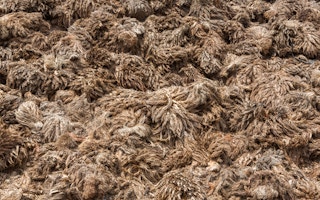Thailand-based Pulp Green Tech Holding (PGT) said this week that it has successfully produced a high-grade paper pulp from empty fruit bunch (EFB) of palm oil.
The research and development company, which promotes the production of papers without cutting trees, said the paper pulp offers quality material that comes from 100 per cent palm oil waste.
With an estimated 300 million tonnes of EFB disposed every year, the company, which owns paper company Thai Gorilla Pulp in Thailand, said it sees huge opportunity to develop the market. It says its green innovation is highly cost efficient and is competitive with other non tree pulp materials and could offer return on investments to investors and producers in the first year of operations.
Making paper pulp from EFB is cost efficient as the raw material is virtually free in countries producing palm oil, Ryosuke Tanaka, CEO of Thai Gorilla Pulp told Eco-Business.
The biggest obstacle in using the EFB for paper pulp was the lack of cohesiveness of the pulp that makes it unsuitable for paper use, which the company has achieved to produce high-quality EFB pulp, Tanaka said.
“
With an estimated 300 million tonnes of EFB disposed every year, the company, which owns paper company Thai Gorilla Pulp in Thailand, said it sees huge opportunity to develop the market
He explained that the company employs a non-toxic production process which enables the company to use less labour and water. Electricity consumption is also limited as against other pulping method. “The EFB itself can be used to generate the electricity and steam required to form a pulp sheet,” Tanaka added.
Thai Gorilla Pulp’s pilot factory in Rayong showcases prototype machineries that reduce the consumption of energy, chemical, and water. From 2010 to 2011, the company reported an eight per cent yield in its usage, according to its website.
The tree-free paper business using EFB has caught up in Malaysia a few years ago with a few startups initiating the trend.
Globally, the commercialisation of tree-free pulp and paper could range from the use of agricultural waste wheat in North America and Australia, to rice straws, sugarcane fibre and even banana stalks especially in developing countries, research shows.
Tanaka said that the market for non-wood pulp is currently very small, especially in Asia. But he said that the company’s technology can usher the market into a change in the pricing structure of the recycled pulp, which is currently 40 per cent to 50 per cent cheaper compared to other non-wood pulp.
The company said its current market for palm pulp or products made from the pulp include Europe, Malaysia, and locally in Thailand. PGT is eyeing an expansion into Malaysia and Indonesia this year and is set to partner with paper mills and palm oil producers in the region.
TGP’s technology outperforms the other materials available in the market on cost and has proven to work in many paper products, Tanaka said, adding that the business could attract investors who look for profits, and at the same time, be supportive of environmentally sustainable investments.
Some of Thai Gorilla Pulp’s clients include biodegradable food packaging businesses and Thai Airways for its in-flight boxes.

















